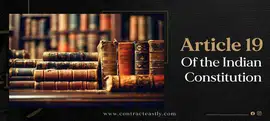
Article 15 in The Constitution Of India 1949 - detailed analysis
As stated by the Central Government Act
Article 15 in The Constitution Of India 1949
15. Prohibition of discrimination on grounds of religion, race, caste, sex or place of birth - Article 15 of the Indian Constitution makes a clear and succinct mention of the right to social equality and the right of equal access to public places. It states that the state will not discriminate its citizens on the basis of their race, caste, religion, caste, sex, or place of birth. Article 15 is a mere extension of the rights provided under Article 14 of the Constitution. The important aspect of Article 15 is that it is applicable only on citizens of India.
(1) The State shall not discriminate against any citizen on grounds only of religion, race, caste, sex, place of birth or any of them - This part of the Article prohibits the state or the government from discriminating against its citizens on the basis of caste, religion, sex, etc. Its main goal is to clarify that the state will follow the rule of equality and show proper conduct when making its law and dealing with its citizens. Thus, any law that would be violative of this part would be liable to be held unconstitutional. The proviso thus completely bars the state from creating any discriminatory laws, rules, or schemes that might be beneficial for a particular section of the society. The state also bars discrimination on the basis of place of birth which essentially means all the states and union territories in India would have to follow this proviso absolutely.
An important case law for the proviso is the case of Yousuf Abdul Aziz v. State of Bombay. In the judgment the Bombay High Court clarified that the Section 497 of the Indian Penal Code, 1860 which deals with adultery was constitutional and not discriminatory. But recently, the Supreme Court has reversed its own decision Yousuf Abdul Aziz and ruled in the case of Joseph Shine v. Union of India that Section 497 was indeed violative of Article 15 and has abolished it.
(2) No citizen shall, on grounds only of religion, race, caste, sex, place of birth or any of them, be subject to any disability, liability, restriction or condition with regard to
(a) access to shops, public restaurants, hotels and palaces of public entertainment; or
(b) the use of wells, tanks, bathing ghats, roads and places of public resort maintained wholly or partly out of State funds or dedicated to the use of the general public.
This part of the Article expands on the previous proviso and states that all citizens in India can access public forums, buildings, restaurants, and other such utilities that is run by state without any discrimination. The proviso states that these public spaces could be maintained either wholly or partly by the state and should always be dedicated to the use of general public.
(3) Nothing in this article shall prevent the State from making any special provision for women and children - The proviso acts as an exception to the previous two parts of Article 15. Article 15(3) essentially states that the state can indeed make laws that are beneficial to the rights of women and children. This is provided so that both women and children are treated equally in society and get all the due rights that they deserve under the Constitution. It was drafted specifically targeting the practice of child labour and women exploitation in the workplaces.
(4) Nothing in this article or in clause ( 2 ) of Article 29 shall prevent the State from making any special provision for the advancement of any socially and educationally backward classes of citizens or for the Scheduled Castes and the Scheduled Tribes. - This proviso is similar to Article 15(3) in that it allows the state to make beneficial laws that aim for the upliftment of the socially and educationally backward classes of persons of the society. It aims to eradicate any ill-treatment of the backward classes of the society by the state and for providing special legislation for their rights.







Posted In: Constitutional Law
Posted By: abhishek.ag2000
Tags: Indian Law, legal, civil law
1115